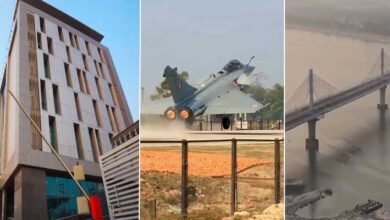Assam: Protest Against Land Transfer to the Indian Air Force in Sonapur
On March 28, 2025, thousands of tribal residents and indigenous organizations gathered to protest against...........

GUWAHATI- In recent days, Sonapur, a town near Guwahati in Assam’s Kamrup (Metro) district, has become a focal point of public unrest due to a proposed transfer of land to the Indian Air Force (IAF). On March 28, 2025, thousands of tribal residents and indigenous organizations gathered to protest against what they perceive as an encroachment on their ancestral lands and a threat to their livelihoods.
The demonstrations, centered around the Digaru Air Force Station, reflect deep-seated concerns over land rights, tribal welfare, and the perceived overreach of government and military authorities.
The unrest in Sonapur started against the Assam state government’s alleged plan to transfer significant tracts of land in the Digaru area to the IAF. This move has been coupled with a notice from the IAF prohibiting construction activities within a 900-meter radius of its existing base in Digaru, intensifying local discontent.
Also Read- Journalist Dilwar Hussain Mazumdar Released on Bail
The affected area is part of a tribal belt, protected under the Assam Land and Revenue Regulation Act, 1886, which aims to safeguard indigenous land rights. The tribal communities, who have resided in the region for generations—some for over 70 years—view the proposed land transfer and construction ban as a direct violation of their legal and cultural entitlements.
The protests gained momentum following earlier notices issued by the Kamrup (Metro) district administration, citing the Works of Defence Act, 1903, which prohibits unauthorized structures near defense installations.
On March 28, 2025, a massive demonstration took place at Sonapur Mini Stadium, drawing nearly 10,000 participants, predominantly from tribal communities. The protesters shut down shops and markets in a symbolic act of resistance, wielding banners and chanting slogans such as “We will give our blood, not our land” and “Down with Digaru Air Force.”
Also Read- Violence Erupts in Boko Ahead of RHAC Polls
The event saw participation from various organizations, including the All Assam Students’ Union (AASU), Assam Tribal Mahasangha, All Tiwa Students’ Union, and Karbi Students’ Union, highlighting widespread solidarity.
The newly formed Brihattar Sonapur Gaon Suraksha Samiti escalated the movement by announcing plans to file a Public Interest Litigation (PIL) in the Gauhati High Court, demanding the relocation of the Digaru Air Force Station.
They also issued a 10-day ultimatum to the Dimoria Sub-District Commissioner to withdraw the construction ban and remove barricades and checkpoints on public roads.
Also Read- Massive Protest by Congress Outside SEBA Office in Guwahati
Further actions included a boycott of selling essential goods like vegetables, fruits, fish, and meat to IAF personnel in local markets, as well as a call for IAF personnel to vacate rented accommodations in Sonapur within 15 days
The tribal communities argue that the land transfer and construction restrictions contravene the Assam Land and Revenue Regulation Act, 1886, which protects tribal belts from alienation. They claim that their ancestral lands, spanning villages such as Sonapur, Digaru, Baruabari, and others, are being unjustly seized.
Notices served to residents for alleged unauthorized structures within the 900-meter radius have raised fears of mass eviction, affecting approximately 10,000 indigenous people across multiple panchayats.
Locals allege that the IAF has failed to honor promises of employment opportunities, instead imposing policies that threaten their economic stability. The boycott of goods to IAF personnel reflects this frustration.
Protesters, including leaders like Ratneshwar Ranghang of the Dimoria Citizens’ Safety Committee, have criticized the government for prioritizing security installations over tribal welfare, accusing authorities of polluting their land, water, and air.
Residents contend that the administration acted unilaterally, ignoring their long-standing presence and rights predating the IAF’s restrictions, some of which were formalized in a 2010 gazette notification.
Meanwhile locals demand include the revocation of the construction ban, withdrawal of eviction notices, removal of IAF barricades, and a halt to the land transfer. They have also called for development projects benefiting the community—such as fisheries, agricultural research centers, or educational institutions—rather than military expansions.
The Kamrup (Metro) district administration has defended its actions, asserting that the notices align with the Works of Defence Act, 1903, and are necessary for national security. The IAF has maintained that the 900-meter restriction zone is a standard protocol to ensure the safety and operational integrity of its base. However, neither the state government nor the IAF has publicly addressed the proposed land transfer or responded to the protesters’ ultimatum as of March 29, 2025.









